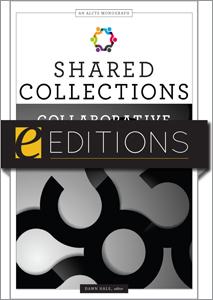
Shared Collections: Collaborative Stewardship — eEditions e-book
The download link for this product can be found on the final confirmation screen after you complete your purchase, and may also be accessed from your Account Profile. For more information about ALA eEditions file types and how to view them on eReaders, desktop computers, and other devices, see this page.
Primary tabs
You don't need to be an ALA Member to purchase from the ALA Store, but you'll be asked to create an online account/profile during the checkout to proceed. This Web Account is for both Members and non-Members. Note that your ALA Member discount will be applied at the final step of the checkout process.
If you are Tax-Exempt, please verify that your account is currently set up as exempt before placing your order, as our new fulfillment center will need current documentation. Learn how to verify here.
- Description
- Table of Contents
- About the authors
- Reviews
Winner of the 2017 Association for Library Collections & Technical Services (ALCTS) Outstanding Publication Award
Libraries and the organizations that provide services to them are devoting more attention to system-wide organization of collections—whether the "system" is a consortium, a region or a country. As a strategy for saving space and money while expanding access to additional materials and resources, the value of shared collections is indubitable. This collected volume from the Association of Library Collections and Technical Services (ALCTS) spotlights the histories and experiences of several collaborations at academic libraries. Contributors share winning strategies for intentional decision-making in developing and managing shared collections, both print and digital, with expert guidance such as:
- analysis of six consortia case studies, ranging from giants like CIC and CARL to regional collaborations like the State of Maine and Manhattan research libraries
- elements to address in a memo of understanding among participating institutions
- risk assessment methodologies that enable institutions to focus local resources where they will provide the greatest return; and
- costs to anticipate for budgeting, such as collection analysis, space, validation, transport, staff, and administration.
With practical advice on issues such as governance and business models, demand driven acquisition, rare works, and access, this monograph is a valuable resource for academic library directors, administrators, and collection development leaders.
List of Illustrations
Preface, by Dawn Hale
Part I Building Shared Collections
1 Collaboration: The Master Key to Unlocking Twenty-First-Century Library Collections
Karla L. Strieb
2 Sustainable Governance and Business Models for Shared Print Collections
Lizanne Payne
3 Scarce and Endangered Works: Using Network-Level Holdings Data in Preservation Decision-Making and Stewardship of the Printed Record
Jacob Nadal, Annie Peterson, and Dawn Aveline
Part II Shared Collections Case Studies
4 Creating a Regional Print Serial Program
Rebecca Crist
5 Exploring Collaborative Stewardship of Government Information in the Southeast: The ASERL Collaborative Federal Depository Program
Cheryle Cole-Bennett, Sandra McAninch, and Heath Martin
6 Maine Shared Collections Strategy: A Statewide Approach to Shared Print Collections
Matthew Revitt
7 Cooperative Collection Development: The Manhattan Research Library Initiative, Electronic Books, and the Scholarly Monograph at Risk
Angela Carreño and William Maltarich
8 Mile High Cooperation: Demand-Driven Acquisition in the Colorado Alliance of Research Libraries
Michael Levine-Clark, Allison V. Level, Joan G. Lamborn, and George Machovec
9 Give Them What They Need: Rethinking Management, Aggregation, and Access for Digital Collections at the University of California
Sherri Berger and Catherine Mitchell
Part III Future Directions
10 Risk, Value, Responsibility, and the Collective Collection
John McDonald and Robert H. Kieft
About the Authors
Index
Dawn Hale
Dawn Hale is the Head of Technical Services at the Sheridan Libraries, Johns Hopkins University, where she is responsible for the library's acquisitions, cataloging, and e-resources management and access. She served on the Editorial Board of the ALCTS Monographs Series, on the LRTS Editorial Board, the Ross Atkinson Lifetime Achievement Award Committee, the ALA Committee on Professional Ethics, the ALA Standards Committee, various LITA scholarship committees, as well as on several OCLC groups.
Core
The former Association for Library Collections and Technical Services (ALCTS), the Library Information Technology Association (LITA), and the Library Leadership and Management Association (LLAMA) are now Core: Leadership, Infrastructure, Futures, a new division of ALA. Its mission is to cultivate and amplify the collective expertise of library workers in core functions through community building, advocacy, and learning.
”With practical advice on issues such as governance and business models, demand driven acquisition, rare works, and access, this monograph is a valuable resource for academic library directors, administrators, and collection development leaders."
— Library Bookwatch
“These essays provide a solid overview of the collaboration landscape while also offering useful tips for those negotiating existing partnerships or contemplating new efforts. Recommended for LIS students and practitioners.”
— Library Journal
“Hale, the editor, has included chapters from 20 contributors, who bring a wealth of experience in planning and implementing shared collections at the consortia, regional, and state levels … Librarians at academic or larger public libraries will find this work informative and useful, whether they are looking to increase efficiencies, maximize access to information, or repurpose space.”
— ARBA
"From an impressive lineup of authors to a useful selection of distinct projects, each one emblematic of a particular problem in cooperative collection management, this work is impressive in both its variety and thematic coherence. Each chapter builds upon the last to some extent to characterize an approach to collection or metadata sharing that promotes the integration and aggregation of local collections into their various networks."
— Technical Services Quarterly


